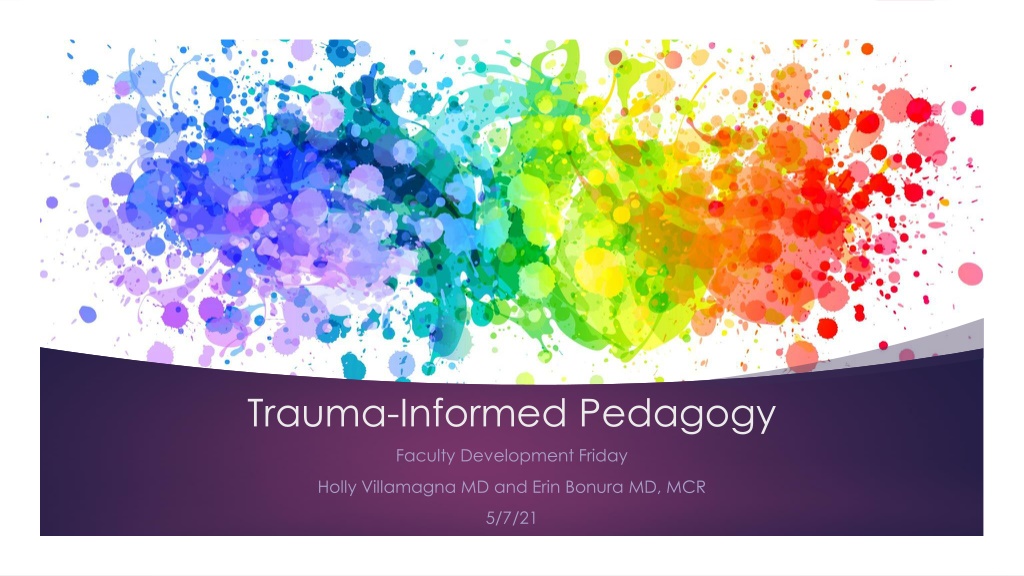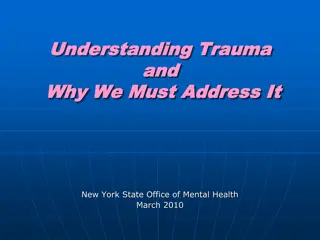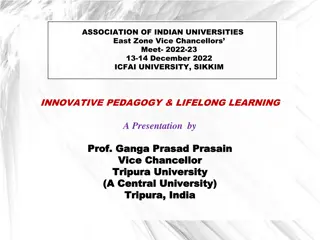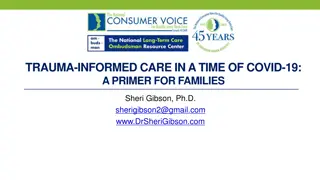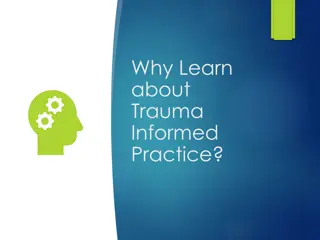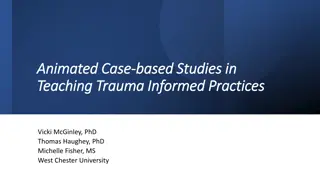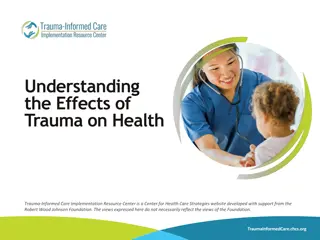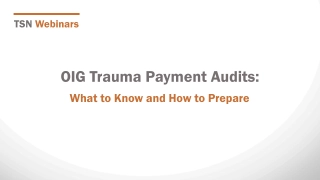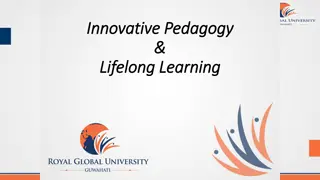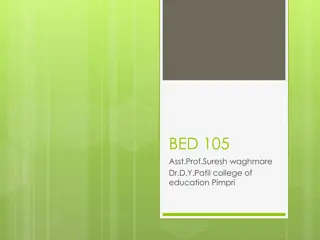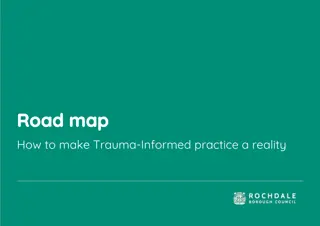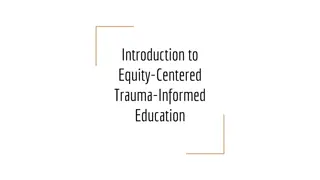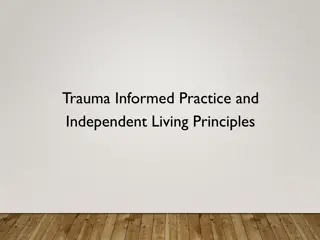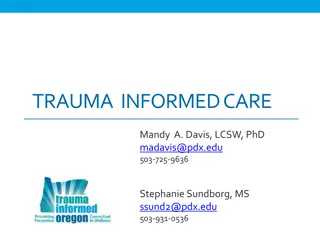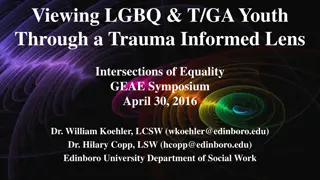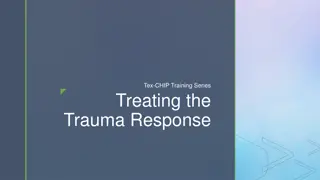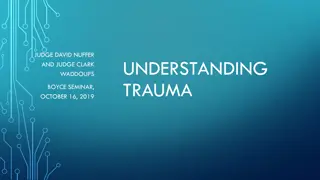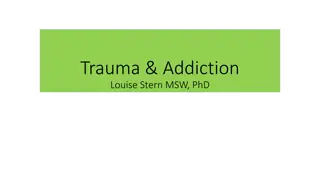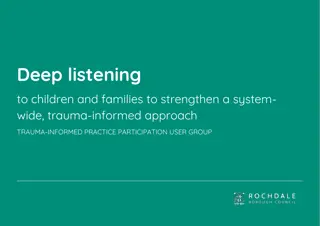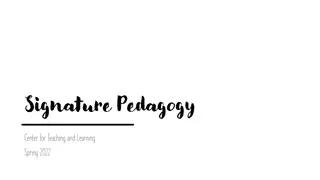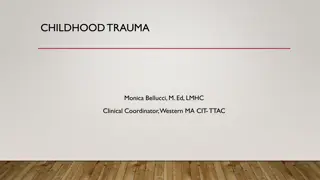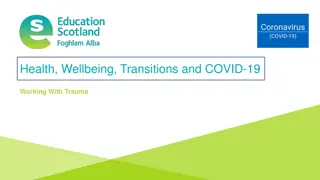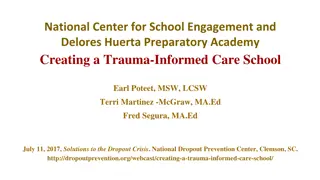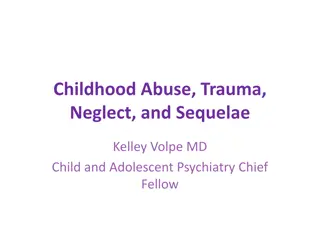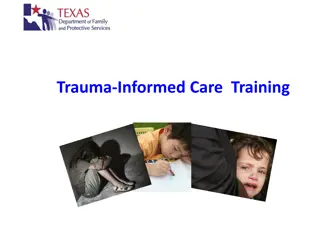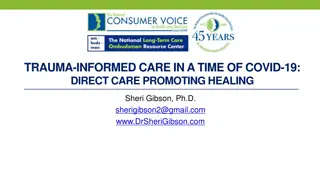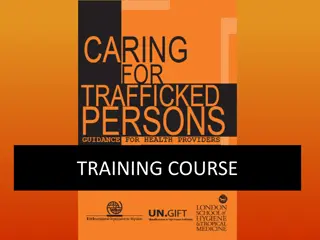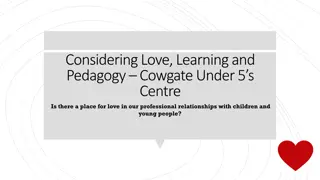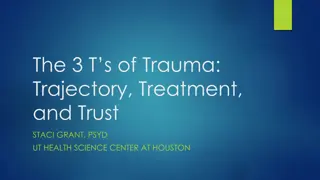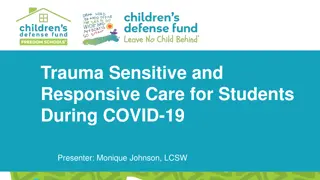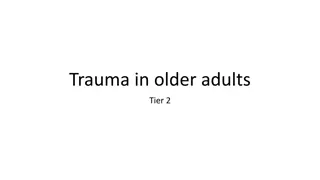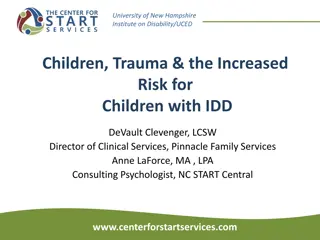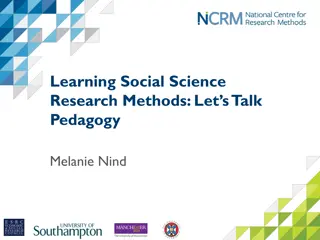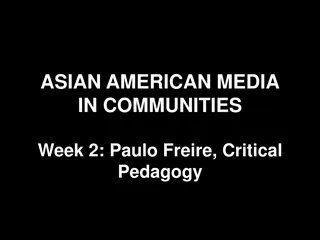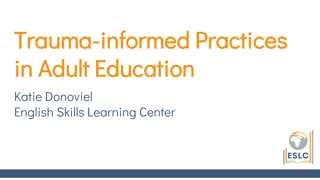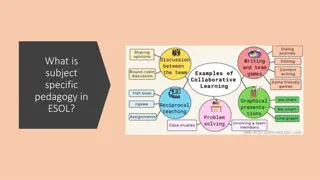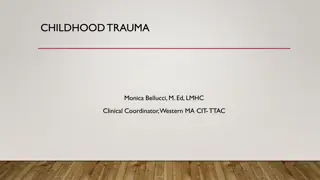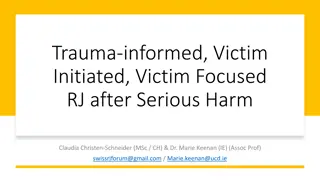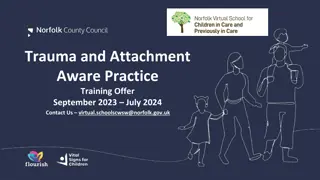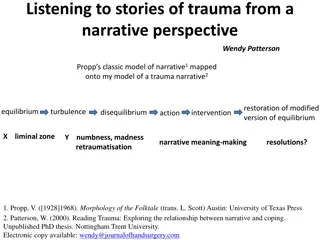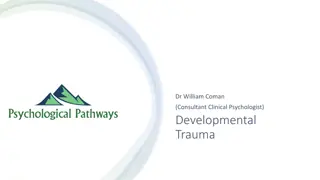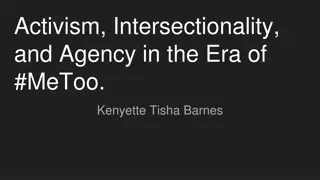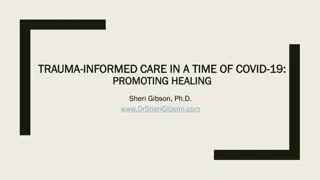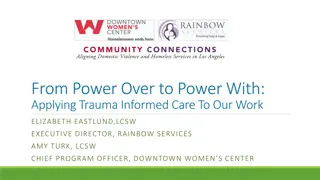Exploring Trauma-Informed Pedagogy in Education
The content delves into Trauma-Informed Pedagogy, an emerging approach in education particularly relevant during the COVID-19 era. It discusses core principles, the link to trauma-informed care, and offers insights from a literature review. Key points include recognizing the impact of stress on learning, adjusting curricula and environments to support learners under stress, and integrating trauma-informed principles into medical education. Various strategies and perspectives are shared to enhance understanding and implementation of trauma-informed pedagogy.
Uploaded on Oct 04, 2024 | 0 Views
Download Presentation

Please find below an Image/Link to download the presentation.
The content on the website is provided AS IS for your information and personal use only. It may not be sold, licensed, or shared on other websites without obtaining consent from the author. Download presentation by click this link. If you encounter any issues during the download, it is possible that the publisher has removed the file from their server.
E N D
Presentation Transcript
Trauma-Informed Pedagogy Faculty Development Friday Holly Villamagna MD and Erin Bonura MD, MCR 5/7/21
Outline Introduction (10 min) Define trauma-informed pedagogy Brief literature review Consider a potential link between trauma-informed care and pedagogy Trauma-informed pedagogy seminar: Mays Imad, PhD (20 min) Breakout discussion #1 (15 min) COVID-19 elective: design, emergent themes, and application to trauma- informed pedagogy (10 min) Breakout discussion #2 (15 min) Regroup and conclusion (10 min)
Introduction to Trauma-Informed Pedagogy The COVID-19 pandemic has accelerated conversations about how educators should address learner stress and trauma Trauma-informed pedagogy is an emerging approach to education, including medical education Core principles of trauma-informed pedagogy: Recognize that stress inhibits learning, and that trauma effects executive functioning and self-regulation Adjust both the curricular content and the learning environment to help learners who are experiencing stress and trauma succeed in their education
Intro to Trauma-Informed Pedagogy: Literature Review Very limited peer-reviewed publications in general education literature, but several recent articles, seminars, etc discussing pedagogical techniques for teaching at times of stress and trauma. For example: Chronicle of Higher Education Trauma-Informed Teaching Explainer suggests: Collaborating with colleagues for ideas and to help manage educator stress Clear course structure and expectations, but with flexibility for students Help students with organization/retention: many reminders about deadlines, more re-emphasizing key concepts while teaching Give students more agency: involve them in course design, creation of assignments Beth McMurtrie, Teaching Newsletter, The Chronicle of Higher Education
Linking Trauma-Informed Pedagogy to Trauma-Informed Care 2020 perspective piece in Academic Medicine proposed integration of the principles of trauma- informed careinto undergraduate medical education to create a new paradigm of trauma- informed medical education Trauma-informed care: recognize prevalence of trauma, create medical environment to promote healing Brown et al. Acad Med. 2020 Jul 14
Outline Introduction (10 min) Define trauma-informed pedagogy Brief literature review Consider a potential link between trauma-informed care and pedagogy Trauma-informed pedagogy seminar: Mays Imad, PhD (20 min) Breakout discussion #1 (15 min) COVID-19 elective: design, emergent themes, and application to trauma- informed pedagogy (10 min) Breakout discussion #2 (15 min) Regroup and conclusion (10 min)
Trauma-Informed Pedagogy Seminar What does trauma-informed pedagogy look like in the classroom? Presenter: Mays Imad, PhD, neurobiologist at Pima Community College Goals of the talk: Understand what trauma is and the physiological impacts of traumatic experiences Impact of trauma on the brain and learning Strategies to mitigate impact of trauma and improve learning Link to seminar
Breakout discussion #1 What is your initial impression of trauma-informed teaching/pedagogy? How do you feel about the connection between trauma- informed care and pedagogy? Do you have any concerns about applying trauma-informed care principles to medical education?
Outline Introduction (10 min) Define trauma-informed pedagogy Brief literature review Consider a potential link between trauma-informed care and pedagogy Trauma-informed pedagogy seminar: Mays Imad, PhD (20 min) Breakout discussion #1 (15 min) COVID-19 elective: design, emergent themes, and application to trauma- informed pedagogy (10 min) Breakout discussion #2 (15 min) Regroup and conclusion (10 min)
COVID-19 Elective: Introduction 2020 international survey data demonstrates that medical students are experiencing significant levels of distress and anxiety due to the pandemic COVID-19 led to removal of medical students from training environments, creating feelings of isolation and disconnect Though students are personally and professionally impacted, societal crises like COVID-19 are not generally addressed in medical school curricula When in-person clinical rotations were canceled at OHSU in March 2020, educators rapidly designed and implemented new virtual electives We created a COVID-19 elective. Our goal was to use both cognitive and humanistic learning theories to create an elective that emphasized both medical knowledge and emotional support.
COVID-19 Elective: Structure Medical Knowledge Emotional Processing and Support Narrative medicine writing Pandemic- related readings with prompts for written responses during the pandemic Expert-Led Relevant Content Basic Science Virology Vaccinology Clinical Science COVID clinical presentation ICU management COVID radiology rounds Collaborative work Journal clubs: HCQ and remdesivir Group presentation on a novel respiratory virus outbreak Reflective Group discussions Led by experience d facilitators Students read, respond to others reflections May 2020 Prompt focusing on personal experience / emotions 2 week, fully virtual elective for clinical-year medical students Structural components: COVID medical knowledge Health Systems Science Infection control Ethics of resource allocation COVID epidemiology Health disparities in COVID Pandemic modeling Hospital emergency response COVID international responses Group assignment: create a COVID infographic Narrative medicine Reflective writing Discussion groups Group projects
COVID-19 Elective: Evaluation Analysis of post-course survey (N=13): Free response questions Both authors independently generated a list of codes What was it like for you to learn about COVID-19 during the pandemic? Authors compared codes and generated final code list and definitions What aspects of the COVID-19 pandemic concern you the most? How have your concerns changed during your participation in the COVID-19 elective? Authors independently tagged responses with codes in Dedoose How has your experience learning about the COVID-19 pandemic changed your perception or understanding of infectious diseases and the public health system? Generated and reviewed code reports What did you like best about the COVID intersession? Authors identified emergent themes then discussed to come to agreement How can we make the COVID intersession the best it can be?
COVID-19 Elective: Results/Themes Themes Disempowered and isolated during COVID-19 students felt disconnected, devalued, and isolated as they were removed from clinical experiences. Timeliness of content increased engagement Students felt highly engaged learning about real-time content they could apply to their lived experience Students value expert-led navigation of the crisis Students valued experts as teachers helping them make sense of the various information streams and developed a sense of security by interacting with the people working on the pandemic response Processing with self and the community students consistently reported that narrative medicine was an essential component - providing prompted, structured time to process individually and with peers was invaluable Shared experiences recognized through reflective writing and peer discussions students reported a sense of belonging and community and decreased sense of isolation Elective participation led to empowerment students felt knowledgeable, valued, and more capable. They found validation in those experts leaving the crisis to teach them.
COVID-19 Elective: Next Steps Seeking IRB approval of qualitative analysis of students reflective writing Goal = utilize qualitative analyses to outline a set of guiding principles for educating students during a societal crisis Ideally, these principles will be widely used to develop novel coursework to teach during other societal crises Considering how our work can contribute to the discussion around trauma- informed medical education
Breakout discussion #2 Consider either a pre-clinical or clinical teaching experience you are involved in. How might you integrate some of the principles or strategies we discussed today into the learning experience? We are discussing trauma-informed medical education in the context of the COVID-19 pandemic. What role should trauma-informed pedagogy play in medical education when we are not in a time of societal crisis?
Wrap up Trauma-informed pedagogy/medical education is an emerging approach to curricular design and implementation We designed a COVID-19 elective that emphasized both medical education and emotional support Group discussion from today
